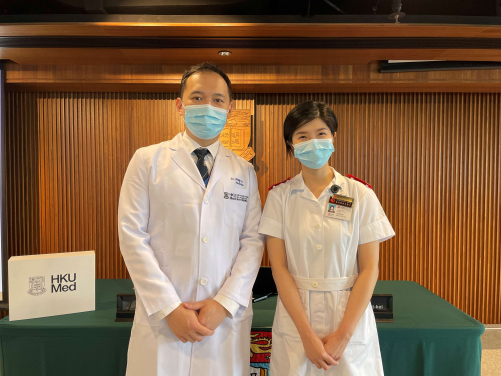Media
HKUMed discovers
90% penicillin allergies labels are false in Hong Kong
and proposes a new testing strategy via
the Hong Kong Drug Allergy Delabelling Initiative (HK-DADI)
21 Nov 2022

Dr Philip Li Hei (left), Division Chief of Rheumatology & Clinical Immunology and Clinical Assistant Professor, Department of Medicine, School of Clinical Medicine, LKS Faculty of Medicine, The University of Hong Kong and Ms Gladys Kwok (right), advanced practice nurse of Hong Kong West Cluster, Hospital Authority introduce the Hong Kong Drug Allergy Delabelling Initiative (HK-DADI).
Download presentation slides
A collaborative research team led by Dr Philip Li from the LKS Faculty of Medicine, The University of Hong Kong (HKUMed) has pioneered a new nurse-led penicillin allergy triage and testing strategy – the Hong Kong Drug Allergy Delabelling Initiative (HK-DADI), and demonstrated its effectiveness and safety compared to traditional allergy testing. Their findings have also led to the development of new guidelines for penicillin allergy testing and establishment of new nurse-led drug allergy clinics in Hong Kong. The research article is now published in the Journal of Clinical Immunology: In Practice [link to the publication].
Research background and findings
Although every 1 in 50 of the Hong Kong population have beta-lactam antibiotic (e.g. penicillin) ’allergy’ labels1, 2, 90% of these labels are found to be incorrect after formal allergy evaluation. Incorrect penicillin allergy labels can be very dangerous; associated with increased mortality, hospitalisation, healthcare costs and development of multi-drug resistant organisms. The adverse effects of incorrect drug allergy labels are even more pronounced among susceptible individuals such as elderly3 and immunocompromised patients4.
Traditionally, the evaluation of suspected drug or penicillin allergy comprises of history-taking and allergy testing (including allergy skin testing and drug provocation tests) performed by Allergists. Unfortunately, Hong Kong has one of the lowest Allergist-to-population ratios in the world5, which severely limits the availability of allergy testing for the public.
Building upon its previous research on drug allergy in Hong Kong, HKUMed designed a new nurse-led penicillin allergy testing strategy – HK-DADI – to overcome the limited number of Allergists in Hong Kong. Under HK-DADI, patients would be interviewed by trained nurses to evaluate patients with suspected penicillin allergy and would be triaged into ‘low-risk’ or ‘non-low-risk’ according to HKUMed’s protocol. Low-risk patients (accounting for about 70% of all evaluated patients) would attend a dedicated low-risk penicillin allergy nurse clinic with penicillin allergy testing performed – and if negative (that is, non-allergic to penicillin), the patients will have their incorrect ‘allergies’ delabelled. Non-low-risk patients would be further evaluated by Allergists.
After evaluating more than 310 patients, 90% of penicillin allergy labels were found to be incorrect and thus delabelled. The delabelling rate of HK-DADI was similar to the traditional pathway (performed by Allergists). No patients developed severe or systemic reactions during or after the evaluation. Compared to the traditional pathway, nurse-led evaluation led to an even higher rate of future penicillin use after delabelling (19% vs 32% after an average of 10 months) and mitigated the need for unnecessary allergy skin testing.
Research significance
‘Incorrect penicillin allergy labels can be potentially lethal and should be delabelled if proven incorrect after appropriate allergy testing. Unfortunately, allergy services are severely limited by the lack of Specialists in Immunology & Allergy in Hong Kong,’ remarked Dr Philip Li, Division Chief of Rheumatology & Clinical Immunology and Clinical Assistant Professor, Department of Medicine, School of Clinical Medicine, HKUMed, ‘The HK-DADI represents a novel multi-disciplinary approach using the combined expertise of physicians and nurses to streamline penicillin allergy testing for the majority of patients in need.’
Dr Li further commented, ‘Given the lack of Specialists in Immunology & Allergy, more multidisciplinary initiatives should be employed to alleviate the overwhelming demand for allergy services in Hong Kong. Hopefully, this is just the first of many much-needed allergy collaborative services to come.’
Findings from this study have also led to the development of new local guidelines for penicillin allergy testing in Hong Kong, enabling non-allergists to independently perform penicillin allergy testing for low-risk patients. Furthermore, new dedicated nurse-led HK-DADI clinics have now been set up across Hong Kong to tackle the tremendous burden of incorrect drug allergy labels across the territory.
About the research team
The research was conducted by Dr Philip Li, Division Chief of Rheumatology & Clinical Immunology and Clinical Assistant Professor; Professor Lau Chak-sing, Daniel C K Yu Professor in Rheumatology and Clinical Immunology, and Chair of Rheumatology and Clinical Immunology of the Division of Rheumatology & Clinical Immunology, Department of Medicine, School of Clinical Medicine, HKUMed; Dr Valerie Chiang, Dr Jane Wong Chi-yan, Chan Tik-suet, Dr Elaine Au Yuen-ling and Dr Carmen Ho Tze-kwan from Queen Mary Hospital. Other collaborators included Andy Kan Ka-chun, Harris Hui Kong-siu, Li Tin-sum, Ian Kwan Yue-kit, Shum Wing-zi and Matthew Yeung Shi-chun, medical student researchers, Division of Rheumatology & Clinical Immunology, Department of Medicine, School of Clinical Medicine, HKUMed.
Media enquiries
Please contact LKS Faculty of Medicine of The University of Hong Kong by email (medmedia@hku.hk).
1 Li PH, Yeung HHF, Lau CS, Au EYL. JAMA Netw Open. 2020 May 1;3(5):e204199.
2 Li PH, Siew LQC, Thomas I, Watts TJ, Ue KL, Rutkowski K, Lau CS. World Allergy Organ J. 2019 Sep 16; 12(8): 100048.
3 Li PH, Chung HY, CS Lau. Hong Kong Med J. 2021 Jun;27(3):192-197.
4 Chan SCW, Chung HY, TT Cheung, Chiu ESH, Lee MSH, Lau CS, Li PH. Diagnostics (Basel) 2020 10(11), 918.
5 Lee TH, Leung TF, Wong G, Ho M, Rosa JS, Li PH, Lau CS, Lam WF, Wu A, Chan E, Lai C, Lau YL. Asian Pac J Allergy Immunol. 2017 Dec 10.
